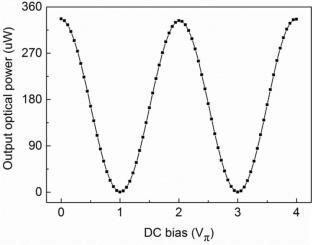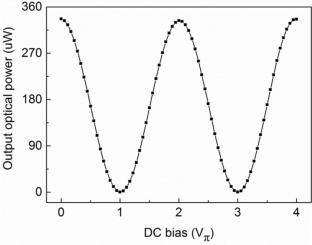单光子水平电光调幅器偏置点的实时稳定
IF 1.7
4区 物理与天体物理
Q2 PHYSICS, MULTIDISCIPLINARY
引用次数: 0
摘要
在量子密钥分配(QKD)系统中,为了产生高消光比(ER)的脉冲,要求电光调幅器(EOAM)必须在最小点处偏置。提出了一种在单光子水平上实时稳定EOAM偏置点的方案。通过采用单光子调制技术,可无限补偿EOAM的最小偏置点漂移,在5000 s内单光子脉冲的ER保持在23.4 dB以上,可直接应用于QKD系统。本文章由计算机程序翻译,如有差异,请以英文原文为准。


Real-time stabilization the bias point of electro-optic amplitude modulator at the single-photon level
In a quantum key distribution (QKD) system, it is demanded that electro-optic amplitude modulator (EOAM) must be biased at the minimum point to generate the high extinction ratio (ER) pulses. We present a scheme for real-time stabilization the bias point of EOAM at the single-photon level. By using the single-photon modulation technology, the minimum bias point drift of the EOAM is compensated endlessly and the ER of single-photon pulses remains above 23.4 dB over 5000 s, which could be directly applied for QKD system.
求助全文
通过发布文献求助,成功后即可免费获取论文全文。
去求助
来源期刊

Indian Journal of Physics
物理-物理:综合
CiteScore
3.40
自引率
10.00%
发文量
275
审稿时长
3-8 weeks
期刊介绍:
Indian Journal of Physics is a monthly research journal in English published by the Indian Association for the Cultivation of Sciences in collaboration with the Indian Physical Society. The journal publishes refereed papers covering current research in Physics in the following category: Astrophysics, Atmospheric and Space physics; Atomic & Molecular Physics; Biophysics; Condensed Matter & Materials Physics; General & Interdisciplinary Physics; Nonlinear dynamics & Complex Systems; Nuclear Physics; Optics and Spectroscopy; Particle Physics; Plasma Physics; Relativity & Cosmology; Statistical Physics.
 求助内容:
求助内容: 应助结果提醒方式:
应助结果提醒方式:


